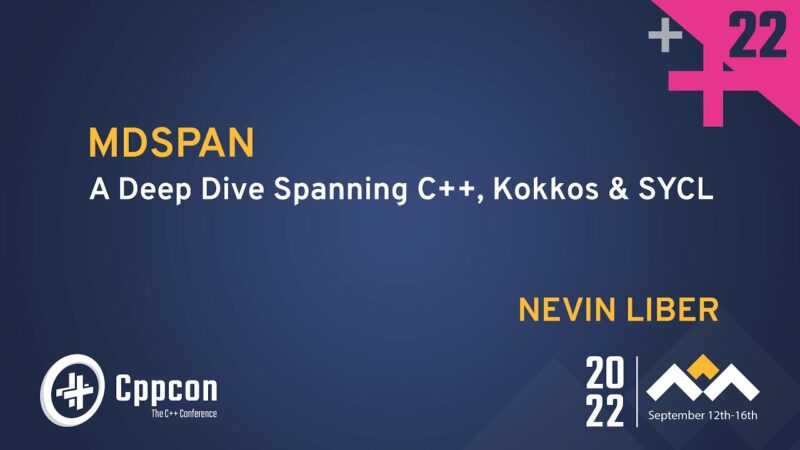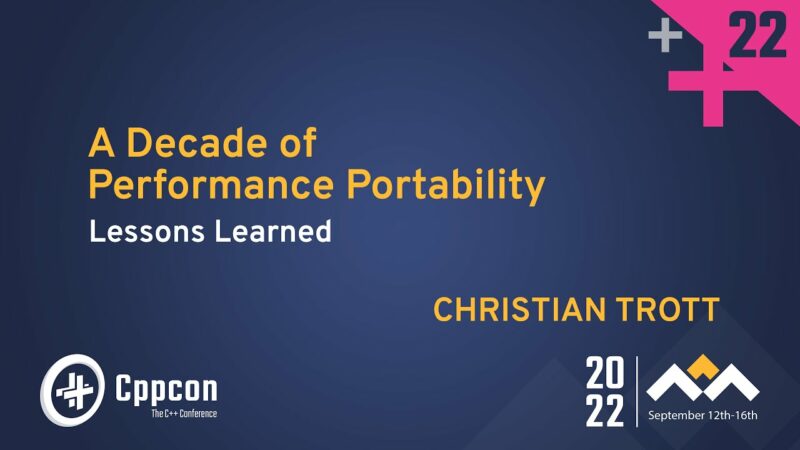https://cppcon.digital-medium.co.uk/tag/cppcon/">cppcon.org/
---
MDSPAN - A Deep Dive Spanning C++, Kokkos & SYCL - Nevin Liber - CppCon 2022
https://github.com/CppCon/CppCon2022
This talk is a deep dive into the history behind MDSPAN (it’s roots being in Kokkos::View), the C++ standardization effort behind it (current status, various tradeoffs made over time, and language changes to help support it) and how SYCL is looking to leverage it in the future. MDSPAN is a non-owning multidimensional array reference, currently slated to be one of the flagship libraries added to C++23. View/reference vocabulary types first entered C++17 with string_view (a non-owning string reference), followed by span (a non-owning single dimension contiguous memory reference) and the ranges library. MDSPAN is the natural progression of this, and one that is critical to distributed (eg. CPU/GPU cppcon.digital-medium.co.uk/tag/programming/">programming) and high-performance computing.
MDSPAN got its roots from Kokkos::View, One key difference between Kokkos::View & MDSPAN: Kokkos::View may be owning (reference-counted reference semantics) or non-owning. The former is also being standardized for C++26 as MDARRAY, although with value and not reference-counted semantics. Separately, in 2014 Microsoft proposed a similar type, array_view, be added to the standard. After a year and a half and seven revisions, it was ultimately abandoned in favor of what is now MDSPAN because it did not provide a zero-overhead abstraction.
The MDSPAN proposal itself has taken seven years and has been through 17 revisions (so far), with input from many different companies as well as the C++ Committee. What changed over the years and why did it change? In parallel, two key language changes were made which ultimately improved the interface: deprecating the comma operator inside square brackets, and the addition of the multidimensional subscript operator. This allows the natural syntax of a[I, j, k] instead of inferior alternatives like a(i, j, k), a[I][j][k] or even a[Index(i), j, k].
---
Nevin Liber
Nevin “:-)” Liber is a Computer Scientist in the ALCF (Argonne Leadership Computing Facility) division of Argonne National Laboratory, where he works on the oneAPI/DPC++/SYCL backend for Kokkos for Aurora. He also represents Argonne on the SYCL and C++ Committees, the latter as Vice Chair of LEWGI/SG18. Back when he started out working at Bell Labs over three decades ago, a friend of his called and asked “What do you know about C++? You folks invented it!” That was enough to get a relatively shy junior engineer to go find the local expert so he could go play with it, and the rest is history! He has worked in C++ across various industries and platforms (big data, low-latency, operating systems, embedded, telephony and now exascale computing, just to name a few). He has also been a C++ Committee member since 2010 and hosted both the C++ and C standards meetings in Chicago.
__
Videos Filmed & Edited by Bash Films: http://www.BashFilms.com
YouTube Channel Managed by Digital Medium Ltd https://events.digital-medium.co.uk
#cppcon.digital-medium.co.uk/tag/cppcon/">cppcon #cppcon.digital-medium.co.uk/tag/programming/">programming #cpp



